Exsultate Jubilate by W.A. Mozart
Exsultate Jubilate by W.A. Mozart
The motet Exsultate, jubilate was composed in Milan in January 1773 while Mozart and his father Leopold were on the last of their three visits to Italy. They had traveled to oversee the first performances of the young composer's Lucio Silla, K. 135, an opera seria commissioned by the ducal theater in Milan. The principal uomo (male soprano) for the premiere was Venanzio Rauzzini (1746-1810) -- one of the most famous castrati of the day, as well as a keyboard player and composer, who later pursued a successful career as a teacher and impresario in Bath, England.
Exsultate Jubilate by W.A. Mozart
Venanzio Rauzzini had sung the role of Cecillo in the opera – “like an angel”,according to Leopold. Mozart must have enjoyed working with a musician who was not only an extraordinary singer but also an accomplished all-rounder who composed and played the piano.

Ducal Theater in Milan
That Mozart wrote a sacred piece which essentially used operatic techniques and forms would have met with little surprise: the two musical worlds, church and opera, often merged in such a manner.
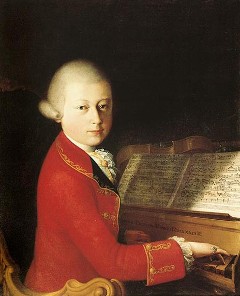
W.A. Mozart, 1770
The definition of “motet” seems as constant as English weather. In the Italy of Mozart’s day, it was “a sacred Latin solo cantata [consisting] of two arias and two recitatives [and] an Alleluia” (Quantz, 1752). So, Mozart was one recitative short of a motet, suggesting that he didn’t quite beat his deadline. The shortfall, though, gave him an idea: soon he would “lose” that one, unconscionably brief recitative, and have in his grasp the formal model for his instrumental concertos!
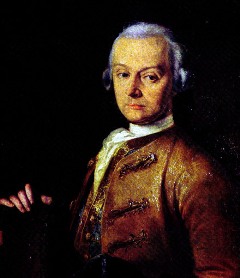
Leopold Mozart, 1765
It is divided into three parts:
1. Allegro (Aria: Exsultate, jubilate) – Recitative (Fulget amica dies) 2. Andante (Aria: Tu virginum corona) 3. Allegro (Alleluia)
The Alleluia section is, by far, the most familiar to listeners, and it is often excerpted for use as a concert aria.
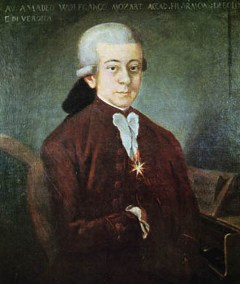
W.A. Mozart, 1777
It is scored simply for strings, oboe, horns, and organ. Mozart composed this music during his stay in Milan in the winter of 72/73 and in fact composed it within two weeks of his 17th birthday. The approximate date of composition and the date of the first performance are established by a characteristically playful and childish postscript to a letter to his sister Nannerl, dated January 16, in which Mozart stated that he had composed a motet to be performed at church the following day.
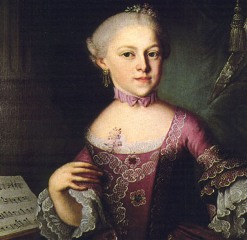
Nannerl Mozart
In 1779, slightly more than six years after the Milan premiere, a new version of Exsultate, jubilate was performed in Salzburg by the castrato Francesco Ceccarelli, probably in Holy Trinity Church on 30 May 1779 at Mass. The diary of Nannerl Mozart mentions that her brother and father lunched that day at the presbytery next to the church.

Holy Trinity Church at Salzburg
The great contrast of mood and style required of the singer—who must negotiate both fast, florid passages and moments of great lyricism—is surely a testimony to Rauzzini's great skill and continues as a benchmark of technical and expressive achievement. One of the most confident and exuberant of Mozart's early works, the motet has justifiably remained one of his most popular works and a glittering showcase for generations of sopranos.
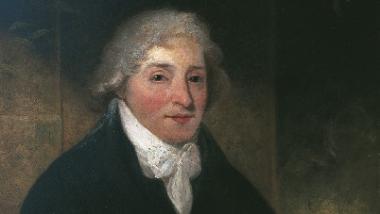
Venanzio Rauzzini
The Motet is called “Exultate Jubilate” because those are the first two words of the text. Those are Latin words meaning rejoice, shout. Each movement begins with an orchestral introduction in the manner of an opera aria. In fact the musical style of this motet is much more operatic than ecclesiastical.
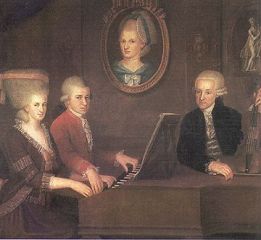
Nannerl, Wolfgang and Leopold Mozart
Mozart Motet (K165)
Exsultate, jubilate, O vos animae beatae exsultate, jubilate, dulcia cantica canendo; cantui vestro respondendo psallant aethera cum me. Fulget amica dies, jam fugere et nubila et procellae; exortus est justis inexspectata quies. Undique obscura regnabat nox, surgite tandem laeti qui timuistis adhuc, et jucundi aurorae fortunatae. frondes dextera plena et lilia date. Tu virginum corona, tu nobis pacem dona, tu consolare affectus, unde suspirat cor. Alleluja.
Translation:
Rejoice, be glad, O you blessed souls, Rejoice, be glad, Singing sweet songs; In response to your singing Let the heavens sing forth with me. The friendly day shines forth, both clouds and storms have fled now; for the righteous there has arisen an unexpected calm. Dark night reigned everywhere [before]; you who feared till now, and joyful for this lucky dawn give garlands and lilies with full right hand. You, o crown of virgins, grant us peace, console our feelings, from which our hearts sigh. Alleluja

Philip Jackson - Exsultate, Jubilate
Last Updated (Thursday, 19 March 2015 15:07)








